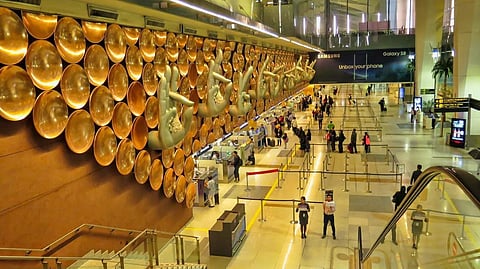
- LIFESTYLE
- FASHION
- FOOD
- ENTERTAINMENT
- EVENTS
- CULTURE
- VIDEOS
- WEB STORIES
- GALLERIES
- GADGETS
- CAR & BIKE
- SOCIETY
- TRAVEL
- NORTH EAST
- INDULGE CONNECT

After achieving the first position in ‘Level 4+’ under Airports Council International’s (ACI)’s airport carbon accreditation program in the Asia-Pacific region, Delhi airport is now India’s first airport to run entirely on hydro and solar power. The airport has switched to hydro and solar power for its consumption needs from June 1, making it India’s first airport to run entirely on a combination of these forms of green energy.
According to Delhi International Airport Limited (DIAL) authorities, around six percent of the airport’s electricity requirement is being met from on-site solar power plants, while the remaining 94 percent of energy is coming from a hydropower plant since June 1.
“The solar plants are on the airside and roofs of the cargo terminals of the IGI airport. For hydropower, DIAL has signed a long-term power purchase agreement (PPA) with a Himachal Pradesh-based hydropower producing company for the supply of hydroelectricity to the airport until 2036,” a DIAL spokesperson told media sources.
The Delhi airport has a 7.84 MW solar power plant on the airside, while it added another 5.3 MW rooftop solar power plant at the cargo terminal recently as part of a stakeholder collaboration.
This transition to renewable energy is expected to help the airport in reducing energy emissions by two lakh tonnes of carbon dioxide per year, according to the operator. The airport announced last year in November that it aims to become a Net Zero Carbon Emission airport by the year 2030.
“DIAL has been working relentlessly towards environmental sustainability and has set its target to make Delhi Airport a Net Zero Carbon Emission airport by 2030, way ahead of the global target of 2050. To achieve this, DIAL adopted a green transportation program recently, and now achieved another milestone of the green energy program for IGI airport. Delhi airport has been using solar power for a long time and it is now fulfilling its major electricity needs from a hydropower plant. Running Delhi airport completely on renewable sources of energy is indeed a major milestone achieved by DIAL,” CEO Videh Kumar Jaipuriar was quoted as saying by media sources.
The other green initiatives at the airport include green buildings, green transportation measures such as electric vehicles, improving operational efficiency to reduce emissions, and management of greenhouse gases (GHG) as part of the Airport Council International’s (ACI) Airport Carbon Accreditation.
In 2019, DIAL had introduced TaxiBots – a vehicle that allows aircraft in taxiing without requiring them to turn on their engines, thus further reducing carbon emissions, while this year for World Environment Day, it announced that it will be adding 62 electric vehicles to its fleet of vehicles in the next three to four months, thus phasing out all its diesel and petrol vehicles.
In 2015, the Cochin International Airport in Kerala became the first airport in the world to run solely using solar energy. DIAL says while they are using a combination of hydro and solar power, a major chunk of this is now hydro-dependent. This is part of the airport’s goal to achieve the ‘Net Zero Carbon Emissions Airport’ target by the year 2030, DIAL said.